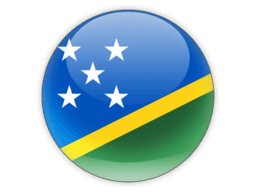
Cities of Solomon Islands
Discover 9 cities across 9 regions
Central Province(1)
Choiseul Province(1)
Guadalcanal Province(1)
Honiara(1)
Isabel Province(1)
Makira-Ulawa Province(1)
Malaita Province(1)
Temotu Province(1)
Western Province(1)
Solomon Islands is a sovereign country located in the southwestern Pacific Ocean, east of Papua New Guinea. It consists of a double chain of islands and atolls, with a total of 992 islands and a land area of 28,400 square kilometers. The capital and largest city is Honiara.
The Solomon Islands is a constitutional monarchy with a parliamentary system of government. The country gained independence from the United Kingdom in 1978. The population is around 700,000 people, with most of the people living in rural areas and relying on subsistence agriculture and fishing.
The economy of the Solomon Islands is heavily dependent on agriculture, forestry, and fisheries. The country is also known for its mineral resources, including gold, silver, nickel, and bauxite. Tourism is a growing industry in the Solomon Islands, with visitors coming to enjoy the country's natural beauty, diverse cultures, and World War II history.
The Solomon Islands are home to a rich and diverse range of cultures and languages, with over 70 languages spoken across the islands. Christianity is the dominant religion, with Anglicanism and Roman Catholicism being the largest denominations.
The Solomon Islands are also known for their unique and diverse flora and fauna, including many species found nowhere else in the world. The islands are home to a number of endemic bird species, as well as a variety of marine life, including dolphins, whales, and sea turtles.
Telephone Code
677
Local Emergency Phone
911
Vaccinations
An International Certificate of Vaccination for yellow fever is required for travelers arriving from countries with a risk of yellow fever transmission and for travelers having transited through the airport of a country with risk of yellow fever transmission. See WHO recommendations.
Climate
Tropical monsoon; few temperature and weather extremes
Currency (Code)
Solomon Islands dollars (SBD)
Electricity/Voltage/Plug Type(s)
230 V / 50 Hz / plug types(s): G, I
Major Languages
Melanesian pidgin, English; note: 120 indigenous languages
Major Religions
Protestant 73.4% (Church of Melanesia, South Sea Evangelical, Seventh Day Adventist, United Church, Christian Fellowship Church), Roman Catholic 19.6%, other Christian 2.9%
Potable Water
Opt for bottled water
International Driving Permit
Suggested
Road Driving Side
Left
Tourist Destinations
East Rennell; Guadalcanal American Memorial; Bonegi I & II; Morovo Lagoon; Tenaru Falls
Major Sports
Rugby, soccer, futsal (indoor court soccer), beach soccer
Cultural Practices
Tourists are advised to dress modestly and cursing is a crime punishable by a fine, jail time, or both.
Tipping Guidelines
There is no tipping and visitors are requested to honor this local custom. However, visitors can contribute to a shared tipping box whose contents are distributed at Christmas.
Souvenirs
Wood carvings, woven baskets and other woven goods, mother-of-pearl and shell jewelry and other decorative items
Traditional Cuisine
Poi — a savory side dish of rinsed taro roots turned into a paste
Geography
Area
total: 28,896 sq km
land: 27,986 sq km
water: 910 sq km
Climate
tropical monsoon; few temperature and weather extremes
Natural resources
fish, forests, gold, bauxite, phosphates, lead, zinc, nickel
People and Society
Population
714,766 (2023 est.)
Ethnic groups
Melanesian 95.3%, Polynesian 3.1%, Micronesian 1.2%, other 0.3% (2009 est.)
Languages
Melanesian pidgin (in much of the country is lingua franca), English (official but spoken by only 1%-2% of the population), 120 indigenous languages
Religions
Protestant 73.4% (Church of Melanesia 31.9%, South Sea Evangelical 17.1%, Seventh Day Adventist 11.7%, United Church 10.1%, Christian Fellowship Church 2.5%), Roman Catholic 19.6%, other Christian 2.9%, other 4%, unspecified 0.1% (2009 est.)
Population growth rate
1.69% (2023 est.)
Government
Government type
parliamentary democracy under a constitutional monarchy; a Commonwealth realm
Capital
name: Honiara
Economy
Economic overview
lower middle-income Pacific island economy; natural resource rich; primarily subsistence agriculture and fishing; land rights conflicts; fairly low public debt; underdeveloped financial sector; large, state-owned enterprise presence
Real GDP (purchasing power parity)
$1.703 billion (2021 est.)
Real GDP per capita
$2,400 (2021 est.)
Agricultural products
oil palm fruit, sweet potatoes, coconuts, taro, yams, fruit, pulses, vegetables, cocoa, cassava
Industries
fish (tuna), mining, timber
Exports
$413.657 million (2021 est.)
Exports - partners
China 65%, Italy 9%, India 6% (2019)
Exports - commodities
lumber, fish, aluminum, palm oil, cocoa beans (2019)
Imports
$619.46 million (2021 est.)
Imports - partners
China 24%, Australia 13%, South Korea 12%, Singapore 12%, Malaysia 10% (2019)
Imports - commodities
refined petroleum, fish, insulated wiring, broadcasting equipment, excavation machinery (2019)
International Airports in Solomon Islands
Discover 2 major airports serving Solomon Islands
Mark Solomon Islands as Visited
Add Solomon Islands to your personal travel map and track your journey around the world. Share your adventures and see your progress grow!